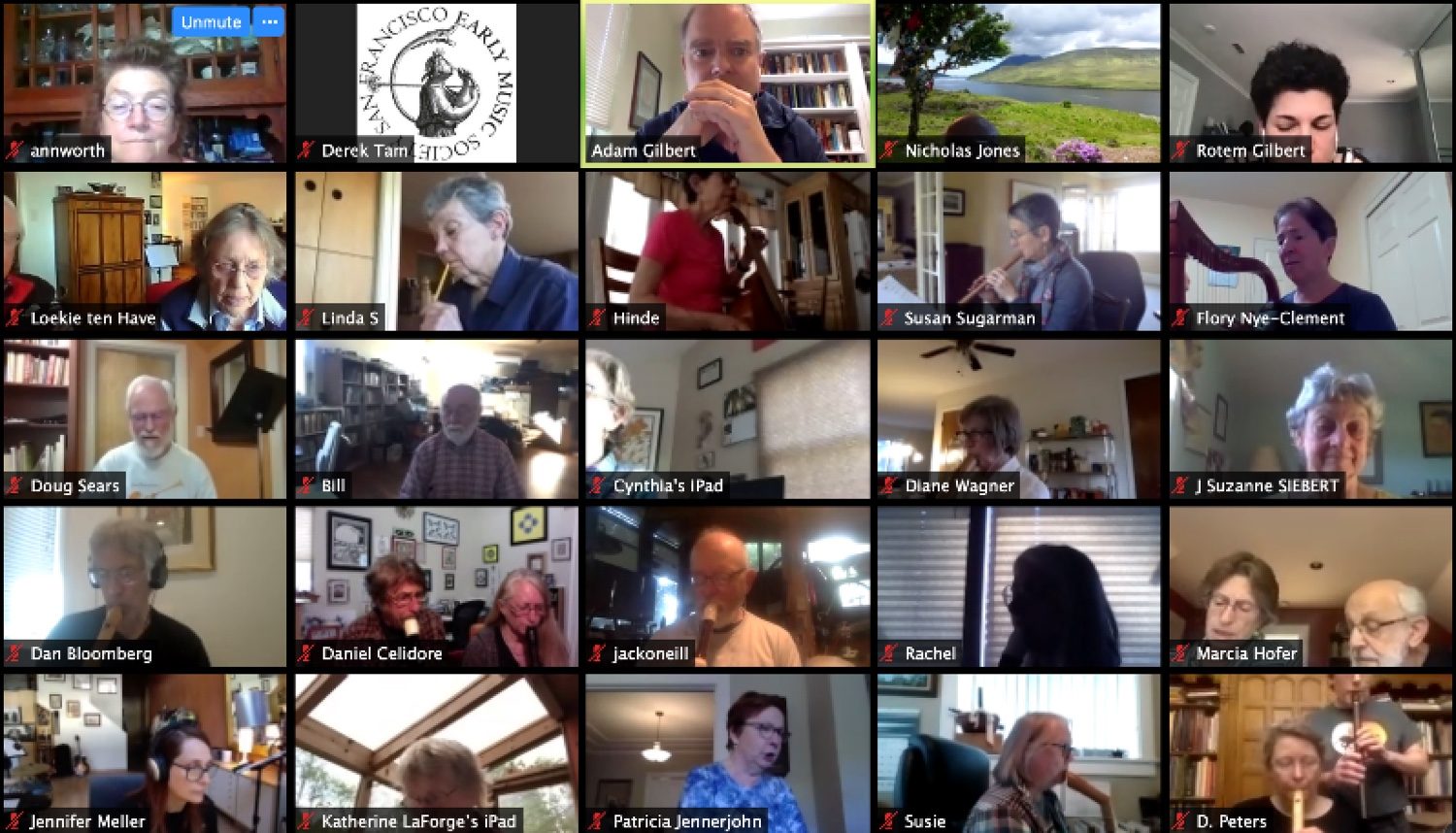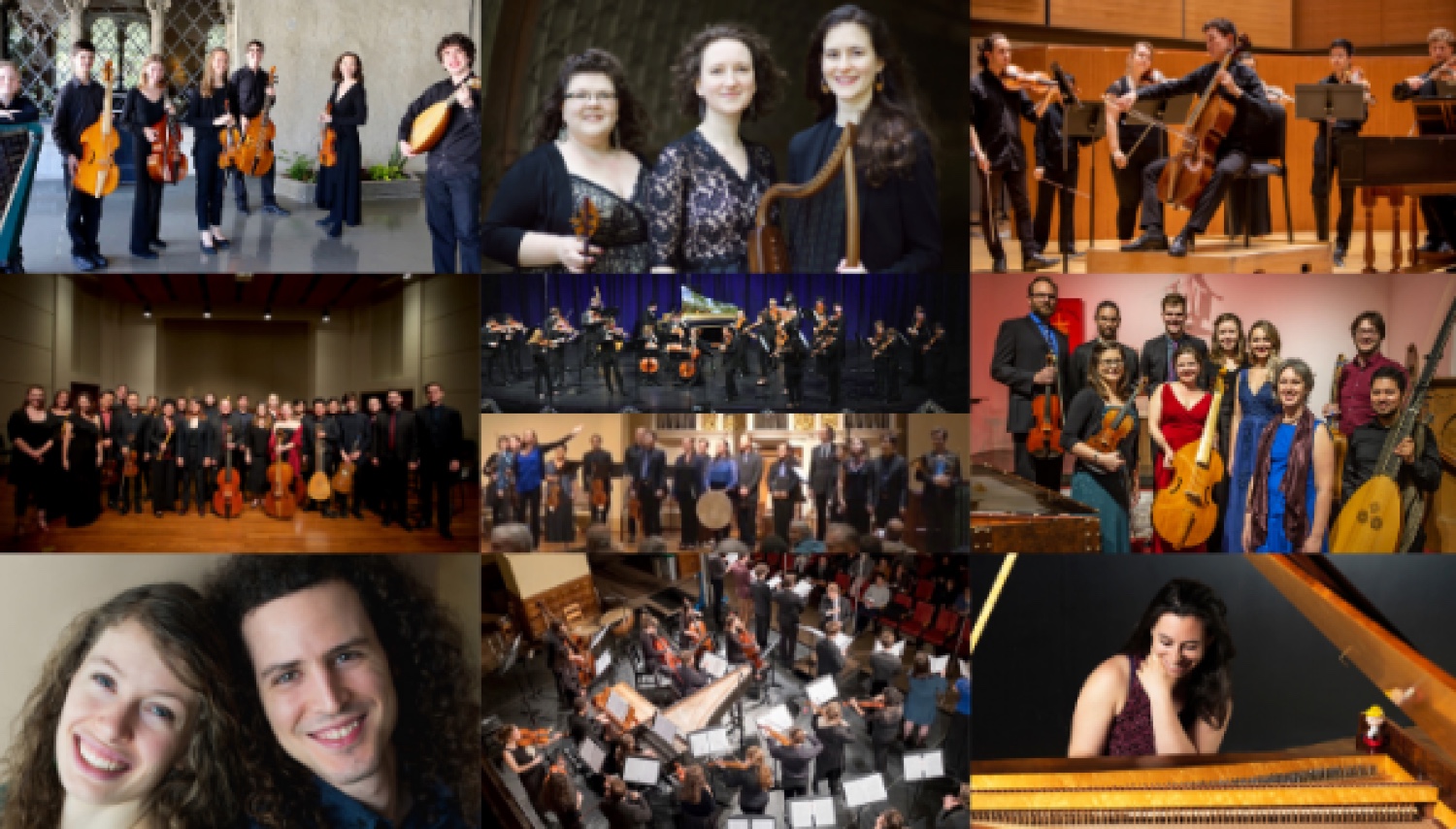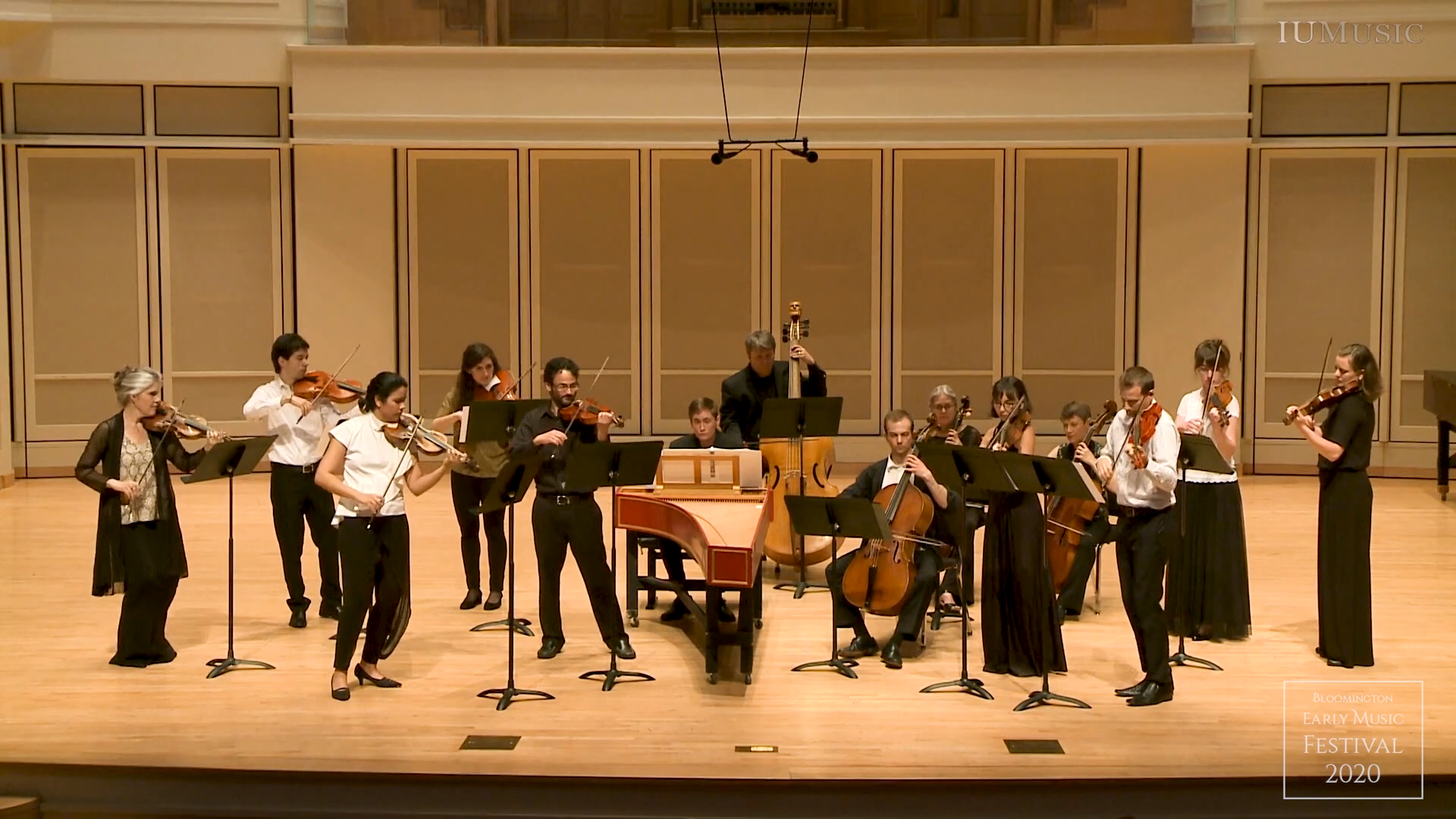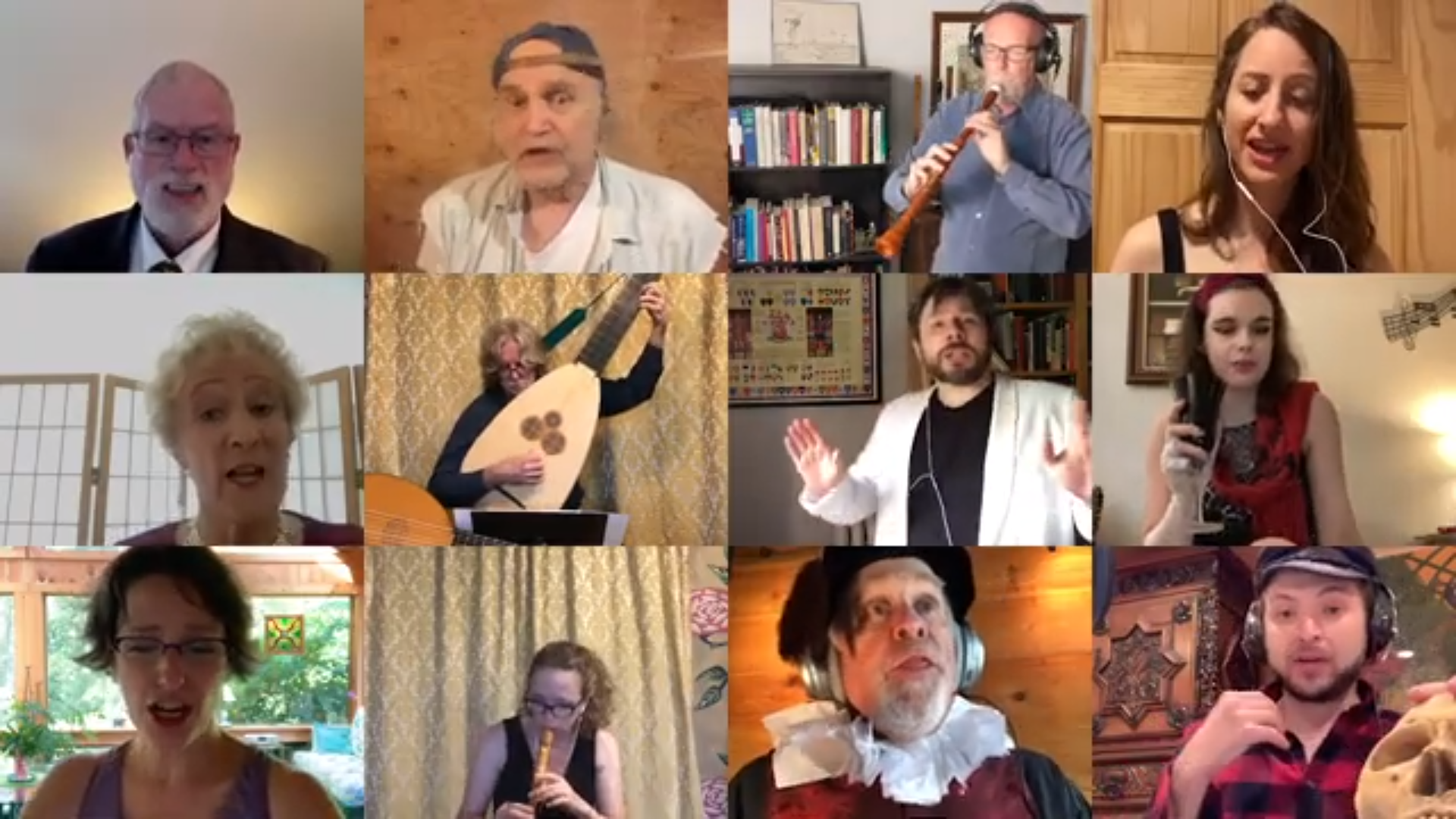
Much like the music it studies, the early music community has proven to be incredibly resilient, adaptive, and thoughtful during a time filled with uncertainty and isolation. Each summer, professional and amateur musicians, emerging artists, and students travel around the country (and the world) for several months of making music, community building, and intensive learning experiences. In March, it became clear that this much-anticipated time, which for many is restorative and inspirational, would take place from our own living rooms or would not be possible. Organizations quickly realized the desperate need for human connection and music during isolation and adapted their summer programming to online formats that were creative, innovative, and supportive for the entire early music community.
The Amherst Early Music Festival offered a full online festival the week of July 6, including 30 classes offered by AEMF faculty, seven Concerts with Conversation, and a fun-filled annual auction. The Early Music & Instrument Exhibition, including introductory videos from makers and purveyors of early instruments, music, and accessories, will be available online through the 2020-2021 season. The AEMF online concert series — featuring performances by Frances Blaker and Letitia Berlin, Phoebe Carrai and Sarah Cunningham, Gwyn Roberts and Richard Stone, Peter Sykes, Benjamin Bagby and Lawrence Rosenwald, Wouter Verschuren and Kathryn Cook, and Glen Valez and Loire Cotler — will be available through Sept. 30.
The American Bach Soloists Festival transitioned into online resources and virtual performances. They shared daily listening recommendations for the first three months of sheltering in place as part of a series called “ABS at Home” and since mid-June have offered “Friday with Friends,” a series of messages and performances from ABS musicians, including Steve Lehning, Tatiana Chulochnikova, Cynthia Black, Ramón Negrón Pérez, Bethanne Walker, and Tekla Cunningham, among others. All installments of “ABS at Home” and “Friday with Friends” are still available on the ABS website. The American Bach Soloists Academy was postponed until 2021, and invitations were extended for participants to attend the workshop in 2021.
The Berkeley Early Music Festival & Exhibition, in collaboration with Early Music America, hosted EMA’s annual Young Performers Festival and Emerging Artist Showcase online the week of June 8. All online performances from 2020 are still available on the EMA YouTube channel. YPF Ensembles: USC Thornton Baroque Sinfonia (Los Angeles, CA) , Indiana University Latin American Music Center (Bloomington, IN), Early Music Youth Academy (Seattle, WA), Davis Senior High School Baroque Ensemble (Davis, CA), McGill University Baroque Orchestra (Montréal, Quebec), and Juilliard415 (New York, NY). EAS Participants: L.A. Camerata, Lyracle, Trobár, and Gili Loftus.

The Bloomington Early Music Festival presented nine virtual concerts the week of May 17. The festival was a combination of beloved program recordings from previous festivals and new virtual collaborations. It included performances by ¡Sacabuche!, Nigel North, Parker Ramsay and Arnie Tanimoto, Forgotten Clefs, Las Aves, and Ingrid Matthews, as well as students and alumni of the IU Historical Performance Institute. Virtual performances are still available on Facebook and YouTube.
Blue Hill Bach hosted a virtual festival the week of July 22, presenting Vivaldi’s Four Seasons over the course of four days, Altenburg’s Concerto in C for Seven Trumpets, “Into the Deep – Music for Low Strings,” and selections from Bach’s St. Matthew Passion by Ian Pomerantz and the virtual Blue Hill Bach chorus and orchestra. Additional festival offerings include a Baroque String Master Class with Jude Ziliak and Anatole Wieck, an illustrated lecture on art in previous pandemics by Sheila ffolliott, a panel discussion and excerpts from The Beggar’s Opera led by Grant Herreid, and an exploration of the origins of J.S. Bach’s Passion Chorale, “O Haupt voll Blut und Wunden,” by Festival Music Director John Finney. The full festival lineup and recordings are still available on the Blue Hill Bach website.
Boston University’s Center for Early Music Studies adapted its May workshop, “Performing Bach’s St. John Passion with Joshua Rifkin,” to a webinar that is available at www.bu.edu/earlymusic/. The center hopes to host the event in person in May 2021.
Although the 2020 Carmel Bach Festival was canceled, it offered a Virtual Young Artist Showcase on July 25. The showcase featured recorded performances from 19 musicians ages 10-18. In honor of the festival, Operation Bach, a collective of musicians who met at the festival, hosted a two-week festival made up of virtual collaborations recorded remotely from around the world.
Charlotte Bach Academy hosted the Virtual Charlotte Bach Festival the week of June 17. The festival lineup featured a series of Zoom lectures and seminars offered by Scott Allen Jarrett, Elizabeth Eschen, Reginald Mobley, and Guy Fishman, as well as an “Afternoon Music” series of recordings from BAC artists Margaret Carpenter Haigh and Nicolas Haigh, Augusta McKay Lodge, Arwen Myers, Bruce Neswick, and Adaiha MacAdams-Sommer.

The Madison Early Music Festival premiered a virtual festival on Facebook the week of July 11. The concert series featured programs by the Orlando Consort, Piffaro, Trefoil, and Nota Bene, all of whom were scheduled to perform in Madison before the pandemic. The festival also included lectures by MEMF faculty J. Michael Allsen, William Hudson, and Peggy Murray, and closed with a virtual all-festival sing along of “Pastyme with good companye,” which has become a beloved song of gathering and togetherness for workshop participants throughout the years.
The Oberlin Baroque Performance Institute, recipient of EMA’s 2020 Laurette Goldberg Award, hosted its 49th annual workshop in an online format, featuring technique classes, lectures, virtual tours of Oberlin’s instrument collections, and daily concerts by workshop faculty.
The Oregon Bach Festival hosted a radio festival featuring archived performance recordings from 1979 to the present, featuring many landmark compositions of late Baroque and early Classical repertoire. Festival highlights include five performances featuring German bass-baritone Thomas Quasthoff, soprano Tamara Wilson’s OBF debut as a last-minute replacement soloist in Verdi’s Requiem, and the Festival Choir and OBF Berkwick Academy Orchestra performance of C.P.E. Bach’s Magnificat, among others. The OBF Berwick Academy was postponed until 2021, with participant offers extended to next year’s festival.

The San Francisco Early Music Society adapted its annual Medieval, Renaissance, Recorder, and Baroque workshops to offer online weekend classes during May, June, and July. The workshops included lectures, technique, and group playing classes for recorder, viols, violin, sackbut, cornetto, Baroque trumpet, cello, harpsichord, voice, bassoon, dulcian, lute, theorbo, and traverso. The society also hosted weekend sherry hours, a highlight of all of the workshops as a time for socialization and community building. Check the society’s website to stay up-to-date on fall programming.
The Treasury of Music Manuscripts, an annual summer course offered by musicologist Michael Alan Anderson in Chicago, was adapted to an online course through the University of Rochester. Over six sessions, participants explored 10 landmark manuscripts representing plainchant and polyphony spanning the 10th through 16th centuries. The manuscripts provide the basis for dialogue on historical context, musical style, notation, editing, and performance issues.
The Whidbey Island Music Festival presented three prerecorded virtual programs the week of Aug. 21. Programs included a Beethoven sonata for piano and cello played by Eric Zivian and Tanya Tomkins, an exploration of music by French composer Zoé de la Ruë (c. 1770-1832) performed by Tekla Cunningham, Tess Altiveros, and Maxine Eilander, and a selection of Beethoven’s 25 Scottish Songs, Op. 108, featuring Tess Altiveros, Brandon Vance, Caroline Nicolas, Stephen Stubbs, and Henry Lebedinsky.
Paulina Francisco is a freelance soprano and arts administrator based in Bloomington, IN. She currently serves as General Manager for the Bloomington Early Music Festival and has served as a summer festival administrator for several organizations around the country. She is in the final year of coursework toward a DM in Historical Performance at Indiana University, with minor specialization in musicology and a Graduate Certificate in vocology.

